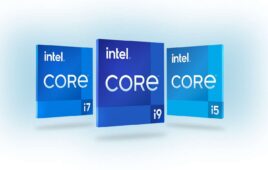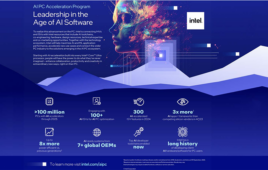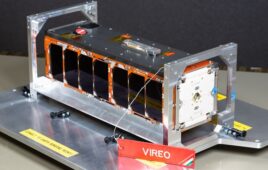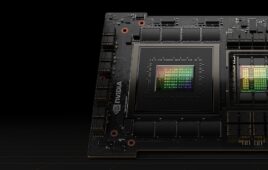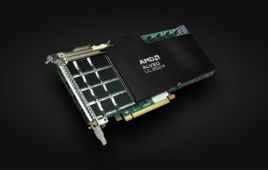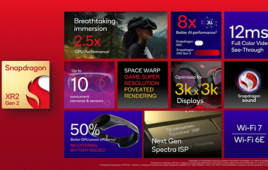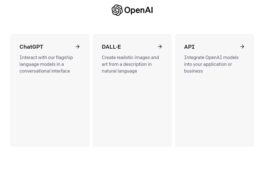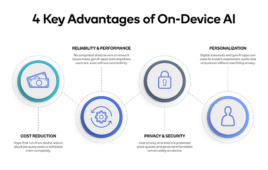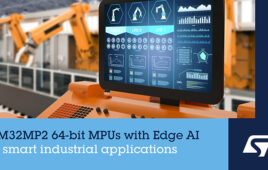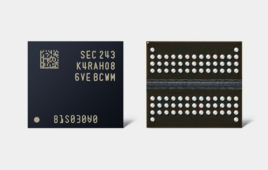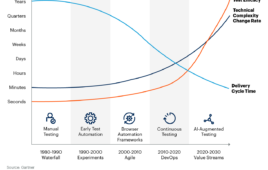ChatGTP, a language-based chatbot developed by OpenAI, has gained a lot of use and attention since its release in 2022. Since then, it and other chatbots — programs designed to mimic human language and conversation — have become increasingly common, used for providing content creation, marketing, programming, research, entertainment, customer service, and much more. Embedded…
Intel Core 14th Gen desktop processors now available
Intel has officially launched the new Intel Core 14th Generation desktop processor family, led by the Intel Core i9-14900K. This latest-generation desktop processor family includes six new unlocked desktop processors, delivering up to 24 cores and 32 threads and up to 6 GHz of frequency right out of the box. Additionally, the Intel Core i7-14700K…
Infineon opens laboratory for quantum electronics and power AI
Infineon Technologies has opened a new laboratory for the development of quantum electronics in Oberhaching near Munich. The objective is to develop and test microelectronic circuits for quantum computers, which will be stable and small, will operate reliably and can be produced on an industrial scale. Approximately 20 researchers will work at the lab. In…
Intel launches industry’s first AI PC Acceleration program
Building on the AI PC use cases shared at Innovation 2023, Intel has launched the AI PC Acceleration program, a global innovation initiative designed to accelerate the pace of AI development across the PC industry. The program aims to connect independent hardware vendors (IHVs) and independent software vendors (ISVs) with Intel resources that include AI…
Harwin’s 1.25mm pitch Gecko connectors are a success
Harwin announces that its high-reliability Gecko connectors, which have been integrated into a research nanosatellite, have been successfully launched and ejected into low Earth orbit (LEO), and, after the deployment of its subsystems, remain fully operational. Momentus, the U.S. commercial space company, recently announced that all customer payloads had been deployed from its Vigoride-6 Orbital Service…
NVIDIA and Tata Group to build large-scale AI infrastructure
NVIDIA announced an extensive collaboration with Tata Group to deliver AI computing infrastructure and platforms for developing AI solutions. The collaboration will bring state-of-the-art AI capabilities within reach to thousands of organizations, businesses, AI researchers, and hundreds of startups in India. The companies will work together to build an AI supercomputer powered by the next-generation NVIDIA GH200…
AMD unveils new fintech accelerator card
AMD announced the AMD Alveo UL3524 accelerator card, a new fintech accelerator designed for ultra-low latency electronic trading applications. Already deployed by leading trading firms and enabling multiple solution partner offerings, the Alveo UL3524 provides proprietary traders, market makers, hedge funds, brokerages, and exchanges with a state-of-the-art FPGA platform for electronic trading at nanosecond (ns) speed.…
Qualcomm launches new XR and AR platforms with immersive experiences
Qualcomm Technologies has announced two new spatial computing platforms — Snapdragon XR2 Gen 2 and Snapdragon AR1 Gen 1 — which will enable the next generation of mixed reality (MR), virtual reality (VR) devices, and smart glasses. Snapdragon XR2 Gen 2 Platform: brings premium MR and VR technology into a single-chip architecture to unlock next-level…
Keysight advances automated testing for mobile apps
Keysight Technologies has released Eggplant Test 7.0, an enhanced version of the automated software test solution with powerful integrations that enable quality-assurance (QA) teams to test mobile apps on multiple devices and operating systems simultaneously. Mobile apps have become a ubiquitous part of modern digital life, facilitating everything from e-commerce and digital health to home…
How to install and run Auto-GPT on Raspberry Pi
ChatGPT, a language model-based chatbot, has been popular since its launch in November 2022 by OpenAI. Currently, it has more than 100 million users. The platform generated 1.6 billion visits in June 2023 alone. The AI chatbot offers several applications, such as language translation, summarization, and content generation. However, it’s not a perfect substitute for…
Qualcomm partnering with Meta to enable on-device AI applications
Qualcomm Technologies and Meta are working to optimize the execution of Meta’s Llama 2 large language models directly on-device — without relying on the sole use of cloud services. The ability to run generative AI models like Llama 2 on devices such as smartphones, PCs, VR/AR headsets, and vehicles allows developers to save on cloud…
Is Sanskrit an ideal language for knowledge representation in AI?
It’s been suggested for decades that Sanskrit might be the ideal language for knowledge representation in artificial intelligence (AI). This is because of Skaskrit’s rule-heavy and formula-based syntax, which makes it a logical and excellent choice for writing algorithms. But is this true? Let’s investigate. Origin The claims that Sanskrit is one of the best…
MLCommons benchmark results showcase Intel AI gains
MLCommons has published results of its industry AI performance benchmark, MLPerf Training 3.0, in which both the Habana Gaudi 2 deep-learning accelerator and the 4th Gen Intel Xeon Scalable processor delivered impressive training results. “The latest MLPerf results published by MLCommons validates the TCO value Intel Xeon processors and Intel Gaudi deep learning accelerators provide…
Intel Labs introduces Latent Diffusion Model for 3D images
Intel Labs, in collaboration with Blockade Labs, has introduced Latent Diffusion Model for 3D (LDM3D), a novel diffusion model that uses generative AI to create realistic 3D visual content. LDM3D is the industry’s first model to generate a depth map using the diffusion process to create 3D images with 360-degree views that are vivid and…
STMicroelectronics offers new Industry 4.0-ready Edge AI-powered microprocessors
STMicroelectronics, a global semiconductor provider serving customers across the spectrum of electronics applications, has introduced the second generation of its STM32 MPUs (microprocessors) with a new architecture built upon the same ecosystem and raising performance and security for applications at the industrial and IoT edge. “The new STM32MP2 Series devices further our investment in application…
The top computer vision tools for embedded systems
Computer vision is reaching new levels, far beyond basic image processing. This is thanks to the integration of artificial intelligence. AI now enables computers and systems to derive meaningful information from digital images that can be used in advanced industries. Currently, one of the most common applications is in security and surveillance. A computer vision…
TI unlocks scalable edge AI performance in smart camera applications
To build on innovations that advance intelligence at the edge, Texas Instruments (TI) introduced a new family of six Arm Cortex-based vision processors that allow designers to add more vision and artificial intelligence (AI) processing at a lower cost, and with better energy efficiency, in applications such as video doorbells, machine vision and autonomous mobile…
STMicroelectronics launches first AI-enhanced smart accelerometers
STMicroelectronics has launched three new accelerometers with advanced processing engines built-in to extend sensor autonomy, enabling systems to respond more quickly to external events while lowering power consumption. The LIS2DUX12 and LIS2DUXS12 leverage ST’s third-generation MEMS technology, adding programmable capabilities including a machine-learning core (MLC), advanced finite state machine (FSM), and an enhanced pedometer. A third entry-level accelerometer, LIS2DU12,…
Samsung develops industry’s first 12nm-class DDR5 DRAM
Samsung Electronics announced the development of its 16-gigabit (Gb) DDR5 DRAM built using the industry’s first 12-nanometer (nm)-class process technology. It has also successfully completed the product evaluation for compatibility with AMD. “Our 12nm-range DRAM will be a key enabler in driving market-wide adoption of DDR5 DRAM,” said Jooyoung Lee, executive VP of DRAM Product…
Keysight Technologies recognized for AI-powered platform
Keysight Technologies, Inc., a technology company that delivers advanced design and validation solutions to help accelerate innovation to connect and secure the world, announced that its Eggplant test automation platform has been named a Leader in “The Forrester Wave: Continuous Automation Testing Platforms, Q4 2022.” Forrester evaluated 15 vendors, assessing them on 26 criteria grouped…


